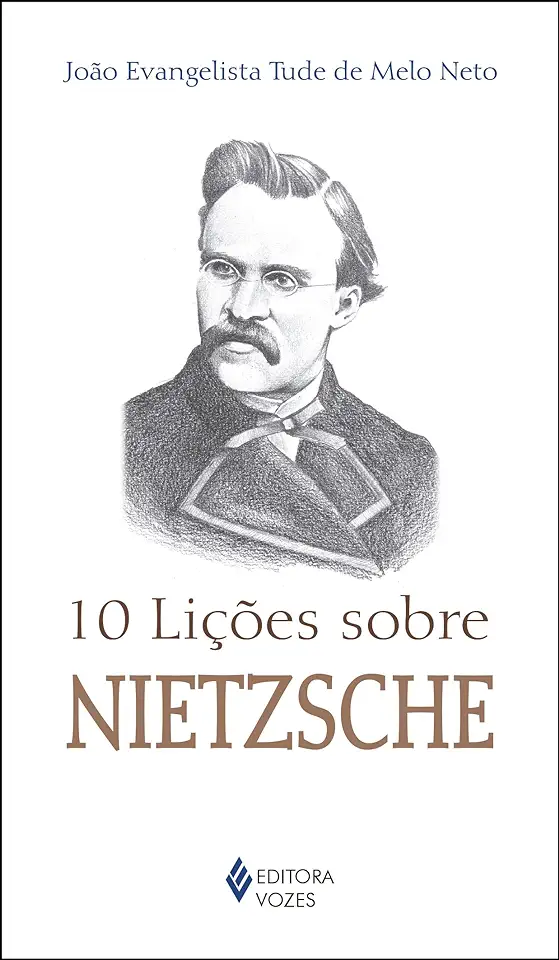
10 Lessons About Nietzsche - João Evangelista Tude de Melo Neto
10 Lessons About Nietzsche: A Comprehensive Guide to the Philosophy of Friedrich Nietzsche
Introduction
Friedrich Nietzsche, one of the most influential philosophers of the 19th century, challenged conventional beliefs and offered profound insights into human existence. His ideas continue to captivate readers, inspiring them to question their own values and beliefs. In "10 Lessons About Nietzsche," João Evangelista Tude de Melo Neto presents a comprehensive exploration of Nietzsche's philosophy, making it accessible to both newcomers and seasoned readers alike.
Chapter 1: The Will to Power
Nietzsche's central concept of the "will to power" forms the foundation of his philosophy. Tude de Melo Neto explains how Nietzsche saw the will to power as the driving force behind all human actions and desires. He argues that Nietzsche's concept of power goes beyond traditional notions of domination and control, encompassing a broader sense of self-affirmation and self-overcoming.
Chapter 2: The Übermensch
Nietzsche's concept of the "Übermensch" (Superman) is often misunderstood and misinterpreted. Tude de Melo Neto clarifies Nietzsche's intention in proposing the Übermensch as a symbol of human potential and self-transcendence. He explores how Nietzsche envisioned the Übermensch as a higher form of human being, one who overcomes conventional morality and embraces their own unique values and creativity.
Chapter 3: Eternal Recurrence
One of Nietzsche's most challenging and provocative ideas is the concept of "eternal recurrence." Tude de Melo Neto delves into the complexities of this concept, explaining how Nietzsche saw it as a means of affirming life and embracing the present moment. He argues that eternal recurrence encourages individuals to live authentically and make the most of their existence, knowing that every moment will repeat itself endlessly.
Chapter 4: The Death of God
Nietzsche's declaration of "the death of God" has had a profound impact on Western thought. Tude de Melo Neto examines the significance of this concept, explaining how Nietzsche saw the decline of religious beliefs and the rise of secularism as an opportunity for individuals to create their own values and forge their own paths in life. He argues that Nietzsche's "death of God" is not a nihilistic rejection of all values, but rather a call for self-determination and self-creation.
Chapter 5: Master and Slave Morality
Nietzsche's distinction between "master morality" and "slave morality" provides a unique perspective on the origins of morality. Tude de Melo Neto explores how Nietzsche saw master morality as arising from a sense of self-affirmation and strength, while slave morality emerged from resentment and weakness. He argues that Nietzsche's analysis of morality challenges conventional notions of good and evil, inviting readers to question the foundations of their own moral beliefs.
Chapter 6: Genealogy of Morals
In his "Genealogy of Morals," Nietzsche offers a critical examination of the origins and development of moral values. Tude de Melo Neto guides readers through Nietzsche's genealogical approach, showing how he traced the evolution of moral concepts from their origins in power dynamics and social conventions. He argues that Nietzsche's genealogy of morals provides a deeper understanding of the complex interplay between power, morality, and human behavior.
Chapter 7: The Antichrist
Nietzsche's controversial work, "The Antichrist," presents a scathing critique of Christianity and its impact on Western culture. Tude de Melo Neto explores Nietzsche's arguments against Christianity, highlighting his criticism of its emphasis on meekness, humility, and other-worldliness. He argues that Nietzsche's "Antichrist" is not simply a rejection of Christianity, but a call for a new, life-affirming philosophy that celebrates human potential and creativity.
Chapter 8: Thus Spoke Zarathustra
"Thus Spoke Zarathustra" is Nietzsche's most famous and influential work, a philosophical novel that presents his ideas in a poetic and allegorical form. Tude de Melo Neto guides readers through the key themes and characters of "Zarathustra," explaining how Nietzsche used this work to convey his philosophy of self-overcoming, self-creation, and the affirmation of life. He argues that "Zarathustra" is a literary masterpiece that offers a profound exploration of human existence and the search for meaning.
Chapter 9: Beyond Good and Evil
In "Beyond Good and Evil," Nietzsche challenges traditional notions of morality and offers a new perspective on the nature of good and evil. Tude de Melo Neto examines Nietzsche's arguments against moral absolutism and his call for a reevaluation of values. He argues that "Beyond Good and Evil" is a provocative and thought-provoking work that invites readers to question their own moral assumptions and embrace a more nuanced understanding of human behavior.
Chapter 10: Twilight of the Idols
"Twilight of the Idols" is a collection of aphorisms and short essays in which Nietzsche critiques various cultural, philosophical, and religious beliefs. Tude de Melo Neto explores Nietzsche's iconoclastic style and his relentless questioning of conventional wisdom. He argues that "Twilight of the Idols" is a powerful and insightful work that encourages readers to think critically and challenge their own assumptions about the world.
Conclusion
"10 Lessons About Nietzsche" is an essential guide for anyone interested in understanding the philosophy of Friedrich Nietzsche. João Evangelista Tude de Melo Neto's clear and engaging writing style makes complex ideas accessible to readers of all levels. Through ten comprehensive chapters, Tude de Melo Neto provides a thorough exploration of Nietzsche's key concepts, challenging readers to question their own beliefs and values. This book is a must-read for anyone seeking a deeper understanding of one of the most influential thinkers of the modern era.
Enjoyed the summary? Discover all the details and take your reading to the next level — [click here to view the book on Amazon!]